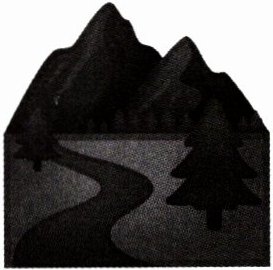B
Around the world, there are about 7,000 national parks. Most of them cover huge areas of land where nobody lives. However, the national parks in England include places where people live and work, as well as wild areas where there are few human activities.
work, as well as wild areas where there are few human activities.
The national parks in England are called "England's Breathing Spaces" because they are places where people can go to be in the open air, away from the dirt and noise of cities. They provide wonderful scenes of mountains, woods, grasslands and wetlands. And there are plenty of activities to do in all of the national parks in England. Visitors can walk or ride bikes for fun. Many of the parks hold activities for families.
Every year there are about 110 million visitors to the parks, bringing many benefits to the areas. At the same time, it creates problems too. First, life can be difficult for local people. Car parks and roads are too crowded. Gift shops and cafés take the place of many everyday shops. Besides, country roads can be damaged, for too many people walk, cycle or ride horses on them. Another big problem to the national parks is litter. In the parks it is a danger to wild animals. Broken glass can also cause fires by focusing the rays of the sun. Such fires in wild places can be out of control.
All national parks in England are making more rules, which tell people how to take good care of their environment. If these rules are followed, the national parks will be well kept and continue to give pleasure to many people for a very long time.
词汇
take the place of 代替 out of control 失控
pleasure /'pleʒə(r)/ n. 快乐;玩乐,休闲
句型
Broken glass can also cause fires by focusing the rays of the sun. 碎玻璃也可以通过聚焦太阳光而引发火灾。
理解
1. What problems do the visitors cause to the parks?
2. What can we do to protect the places of interest?
Around the world, there are about 7,000 national parks. Most of them cover huge areas of land where nobody lives. However, the national parks in England include places where people live and
 work, as well as wild areas where there are few human activities.
work, as well as wild areas where there are few human activities.The national parks in England are called "England's Breathing Spaces" because they are places where people can go to be in the open air, away from the dirt and noise of cities. They provide wonderful scenes of mountains, woods, grasslands and wetlands. And there are plenty of activities to do in all of the national parks in England. Visitors can walk or ride bikes for fun. Many of the parks hold activities for families.
Every year there are about 110 million visitors to the parks, bringing many benefits to the areas. At the same time, it creates problems too. First, life can be difficult for local people. Car parks and roads are too crowded. Gift shops and cafés take the place of many everyday shops. Besides, country roads can be damaged, for too many people walk, cycle or ride horses on them. Another big problem to the national parks is litter. In the parks it is a danger to wild animals. Broken glass can also cause fires by focusing the rays of the sun. Such fires in wild places can be out of control.
All national parks in England are making more rules, which tell people how to take good care of their environment. If these rules are followed, the national parks will be well kept and continue to give pleasure to many people for a very long time.
词汇
take the place of 代替 out of control 失控
pleasure /'pleʒə(r)/ n. 快乐;玩乐,休闲
句型
Broken glass can also cause fires by focusing the rays of the sun. 碎玻璃也可以通过聚焦太阳光而引发火灾。
理解
1. What problems do the visitors cause to the parks?
Life can be difficult for local people. Car parks and roads are too crowded. Gift shops and cafés take the place of many everyday shops. Country roads can be damaged. Litter is a danger to wild animals and broken glass can cause fires.
2. What can we do to protect the places of interest?
Follow the rules made by national parks to take good care of the environment.
答案:1. Life can be difficult for local people. Car parks and roads are too crowded. Gift shops and cafés take the place of many everyday shops. Country roads can be damaged. Litter is a danger to wild animals and broken glass can cause fires.
2. Follow the rules made by national parks to take good care of the environment.
2. Follow the rules made by national parks to take good care of the environment.
解析:
翻译:
### B
在全球范围内,大约有7000个国家公园。它们中的大多数都占据了大片无人居住的土地。然而,英国的国家公园既包括人们生活和工作的地方,也包括人类活动很少的荒野地区。
英国的国家公园被称为“英格兰的呼吸空间”,因为人们可以去那里享受户外的空气,远离城市的污浊和喧嚣。它们展现了山脉、森林、草原和湿地的美妙景色。而且在英国的所有国家公园里都有大量的活动可供开展。游客可以散步或骑自行车来消遣。许多公园还为家庭举办活动。
每年大约有1.1亿游客前往这些公园,这给这些地区带来了诸多益处。但与此同时,也产生了一些问题。首先,当地居民的生活可能会变得困难。停车场和道路过于拥挤。礼品店和咖啡馆取代了许多日常商店。此外,乡村道路可能会遭到破坏,因为太多人在上面步行、骑自行车或骑马。国家公园面临的另一个大问题是垃圾。在公园里,垃圾对野生动物是一种威胁。碎玻璃还会通过聚焦太阳光而引发火灾。野外的这类火灾可能会失控。
英国所有的国家公园都在制定更多的规定,这些规定会告知人们如何爱护环境。如果这些规定得到遵守,国家公园将会得到良好的维护,并在很长一段时间内继续为许多人带来快乐。
### 词汇
take the place of 代替
out of control 失控
pleasure /'pleʒə(r)/ n. 快乐;玩乐,休闲
### 句型
Broken glass can also cause fires by focusing the rays of the sun. 碎玻璃也可以通过聚焦太阳光而引发火灾。
### 理解
1. 游客给公园带来了什么问题?
2. 我们可以做些什么来保护这些名胜古迹?
### B
在全球范围内,大约有7000个国家公园。它们中的大多数都占据了大片无人居住的土地。然而,英国的国家公园既包括人们生活和工作的地方,也包括人类活动很少的荒野地区。
英国的国家公园被称为“英格兰的呼吸空间”,因为人们可以去那里享受户外的空气,远离城市的污浊和喧嚣。它们展现了山脉、森林、草原和湿地的美妙景色。而且在英国的所有国家公园里都有大量的活动可供开展。游客可以散步或骑自行车来消遣。许多公园还为家庭举办活动。
每年大约有1.1亿游客前往这些公园,这给这些地区带来了诸多益处。但与此同时,也产生了一些问题。首先,当地居民的生活可能会变得困难。停车场和道路过于拥挤。礼品店和咖啡馆取代了许多日常商店。此外,乡村道路可能会遭到破坏,因为太多人在上面步行、骑自行车或骑马。国家公园面临的另一个大问题是垃圾。在公园里,垃圾对野生动物是一种威胁。碎玻璃还会通过聚焦太阳光而引发火灾。野外的这类火灾可能会失控。
英国所有的国家公园都在制定更多的规定,这些规定会告知人们如何爱护环境。如果这些规定得到遵守,国家公园将会得到良好的维护,并在很长一段时间内继续为许多人带来快乐。
### 词汇
take the place of 代替
out of control 失控
pleasure /'pleʒə(r)/ n. 快乐;玩乐,休闲
### 句型
Broken glass can also cause fires by focusing the rays of the sun. 碎玻璃也可以通过聚焦太阳光而引发火灾。
### 理解
1. 游客给公园带来了什么问题?
2. 我们可以做些什么来保护这些名胜古迹?